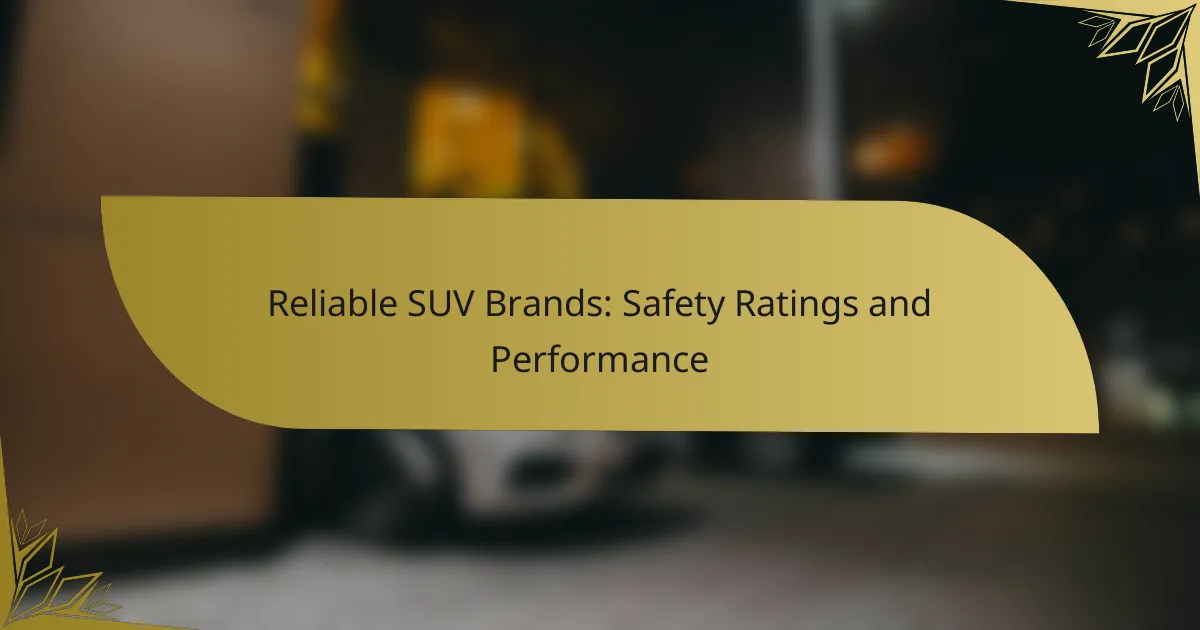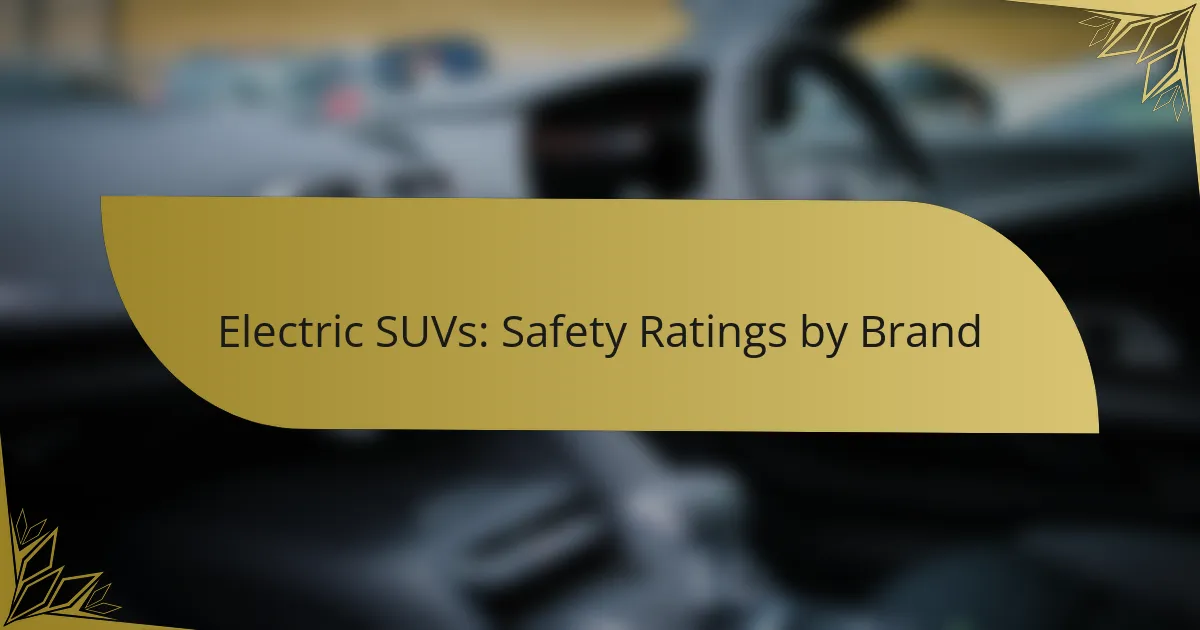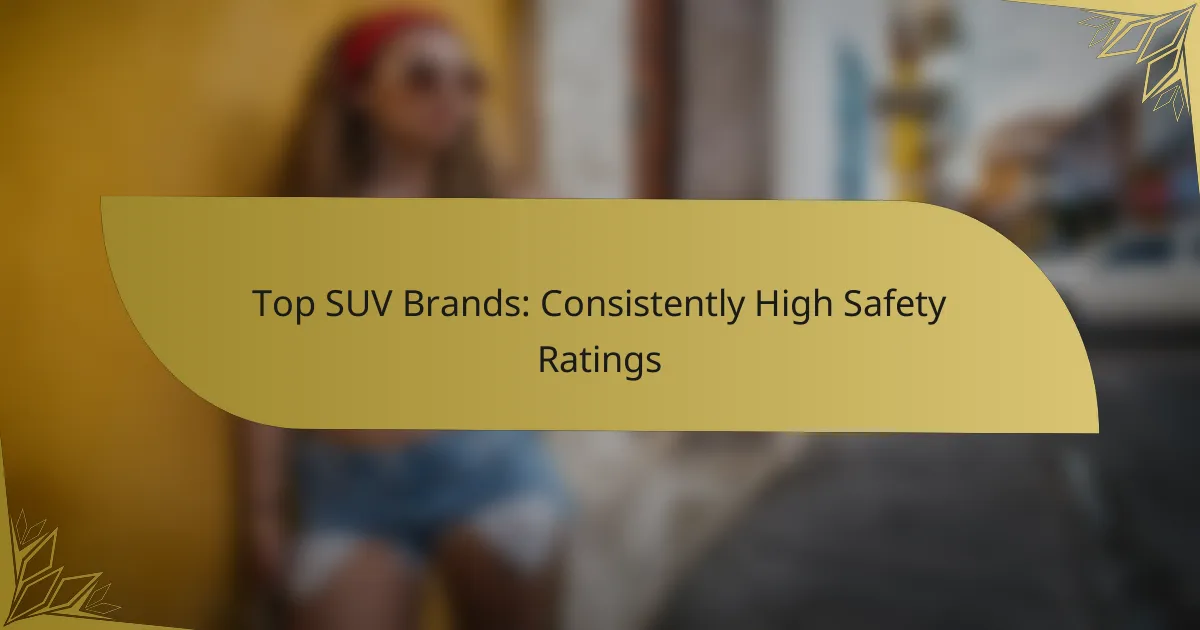When choosing an SUV, safety ratings and performance are crucial factors that can greatly influence purchasing decisions. Brands like Volvo, Toyota, and Subaru are renowned for their high safety ratings, consistently excelling in crash tests and assessments. In 2023, top-performing models such as the Tesla Model Y and BMW X5 stand out for their reliability and advanced safety features, catering to the needs of safety-conscious consumers.

Which SUV brands have the highest safety ratings?
Brands known for high safety ratings include Volvo, Toyota, Subaru, Honda, and Ford. These manufacturers consistently perform well in crash tests and safety assessments, making them reliable choices for safety-conscious consumers.
Volvo safety ratings
Volvo is renowned for its commitment to safety, often achieving top marks in various safety tests. Many of its models, such as the XC90 and XC60, frequently earn five-star ratings from organizations like Euro NCAP and the IIHS.
The brand’s emphasis on advanced safety features, such as automatic emergency braking and collision avoidance systems, enhances its reputation. Volvo aims to eliminate fatalities in its vehicles, showcasing its dedication to passenger safety.
Toyota safety ratings
Toyota vehicles, including the RAV4 and Highlander, consistently receive high safety ratings from the IIHS and NHTSA. The brand’s Safety Sense suite, which includes adaptive cruise control and lane departure alert, contributes to its strong performance in safety evaluations.
With a focus on reliability and safety, Toyota models are often recommended for families. The combination of robust construction and advanced safety technology makes them a popular choice among consumers.
Subaru safety ratings
Subaru is recognized for its impressive safety ratings, particularly with models like the Outback and Forester. These vehicles often receive top ratings from both the IIHS and NHTSA, thanks to their standard all-wheel drive and advanced safety features.
The brand’s EyeSight Driver Assist Technology, which includes features like pre-collision braking, enhances safety further. Subaru’s commitment to safety is reflected in its marketing and customer satisfaction ratings.
Honda safety ratings
Honda vehicles, such as the CR-V and HR-V, are well-regarded for their safety ratings, frequently earning high scores from safety organizations. The Honda Sensing suite, which includes collision mitigation and road departure mitigation, plays a key role in these ratings.
With a reputation for reliability and safety, Honda models are often favored by families. The brand’s focus on integrating advanced safety technology contributes to its strong performance in safety assessments.
Ford safety ratings
Ford offers several SUVs, like the Escape and Explorer, that achieve commendable safety ratings. Many of these models receive high marks from the IIHS and NHTSA, showcasing their commitment to passenger safety.
Ford’s Co-Pilot360 technology, which includes features like blind-spot monitoring and automatic emergency braking, enhances safety. The brand’s continuous investment in safety technology helps maintain its competitive edge in the SUV market.

What are the best-performing SUVs in 2023?
The best-performing SUVs in 2023 are characterized by their safety ratings, performance metrics, and overall reliability. Key contenders include the Tesla Model Y, BMW X5, Porsche Macan, and Jeep Grand Cherokee, each offering unique features that cater to different preferences and needs.
Tesla Model Y performance
The Tesla Model Y stands out for its impressive acceleration and electric efficiency. It can reach 0-60 mph in approximately 3.5 seconds, making it one of the quickest SUVs in its class.
In terms of safety, the Model Y has received top ratings from the National Highway Traffic Safety Administration (NHTSA) and the Insurance Institute for Highway Safety (IIHS). Its advanced driver-assistance features, such as Autopilot, enhance both performance and safety.
BMW X5 performance
The BMW X5 combines luxury with robust performance, featuring a range of powerful engines. The base model offers a turbocharged inline-six, while higher trims provide V8 options for enhanced power.
Safety ratings for the X5 are consistently high, with advanced safety technologies like lane-keeping assist and adaptive cruise control. Its performance on winding roads is exceptional, thanks to precise steering and a well-tuned suspension system.
Porsche Macan performance
The Porsche Macan is known for its sporty handling and agility, making it a favorite among enthusiasts. It offers a variety of engine options, including a turbocharged four-cylinder and a more powerful V6.
Safety is a priority for the Macan, which features a suite of driver-assistance systems and has earned high safety ratings. Its performance on both city streets and highways is complemented by responsive braking and acceleration.
Jeep Grand Cherokee performance
The Jeep Grand Cherokee excels in off-road capabilities while maintaining a comfortable ride on pavement. With multiple engine choices, including a fuel-efficient V6 and a powerful V8, it caters to diverse driving preferences.
Safety ratings for the Grand Cherokee are solid, bolstered by features like adaptive cruise control and blind-spot monitoring. Its performance in rugged terrains is enhanced by advanced four-wheel-drive systems, making it a versatile choice for adventure seekers.

How do safety ratings impact SUV purchasing decisions?
Safety ratings significantly influence SUV purchasing decisions by providing consumers with critical information about vehicle performance in crash tests and safety features. Higher safety ratings often lead to increased buyer confidence, making these vehicles more appealing in a competitive market.
Consumer preferences
When selecting an SUV, many consumers prioritize safety ratings as a key factor in their decision-making process. Research shows that vehicles with higher safety ratings tend to attract buyers who are particularly concerned about the well-being of their families. As a result, brands known for safety, such as Volvo and Subaru, often see higher demand.
Additionally, consumers may rely on safety ratings from organizations like the National Highway Traffic Safety Administration (NHTSA) or the Insurance Institute for Highway Safety (IIHS) to compare models. These ratings can serve as a deciding factor, especially when choosing between similarly priced options.
Insurance costs
Insurance premiums are often influenced by the safety ratings of SUVs. Vehicles with higher safety ratings typically qualify for lower insurance rates, as insurers view them as less risky to cover. For example, an SUV with a five-star safety rating may result in premiums that are 10-20% lower compared to a model with a lower rating.
When shopping for an SUV, it’s wise to get insurance quotes based on safety ratings. This can help buyers understand the long-term costs associated with their vehicle choice, allowing for more informed financial decisions.
Resale value
Safety ratings can also impact the resale value of SUVs. Models that consistently receive high safety ratings tend to retain their value better over time. This is particularly important for buyers who plan to sell or trade in their vehicle after a few years.
For instance, an SUV with a strong reputation for safety may have a resale value that is 15-25% higher than that of a less safe counterpart. Buyers should consider safety ratings not only for initial purchase decisions but also for future resale potential.

What criteria should you consider when choosing a safe SUV?
When selecting a safe SUV, prioritize crash test ratings, advanced safety features, and reliability ratings. These criteria help ensure that the vehicle not only protects occupants in the event of an accident but also remains dependable over time.
Crash test ratings
Crash test ratings are essential indicators of an SUV’s safety performance. Organizations like the National Highway Traffic Safety Administration (NHTSA) and the Insurance Institute for Highway Safety (IIHS) conduct rigorous tests to evaluate how well vehicles protect occupants during collisions.
Look for SUVs that have received high ratings, typically five stars from NHTSA or “Top Safety Pick” status from IIHS. These ratings reflect the vehicle’s ability to withstand various crash scenarios, providing peace of mind for drivers and passengers.
Advanced safety features
Advanced safety features enhance an SUV’s overall safety profile. Key technologies to consider include automatic emergency braking, lane departure warning, adaptive cruise control, and blind-spot monitoring. These systems work together to prevent accidents and assist drivers in maintaining control.
When evaluating SUVs, check for the availability of these features as standard or optional equipment. Some manufacturers may offer advanced safety packages that bundle multiple technologies, providing better value and enhanced protection.
Reliability ratings
Reliability ratings assess how well an SUV performs over time, impacting its long-term safety and maintenance costs. Brands known for reliability often have fewer recalls and lower rates of mechanical failure, which can contribute to safer driving experiences.
Consult resources like J.D. Power or Consumer Reports for reliability ratings and owner feedback. A reliable SUV not only ensures safety but also reduces the likelihood of unexpected repairs, making it a practical choice for families and individuals alike.



